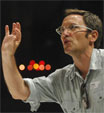 Osvaldo Golijov has a cherished letter from Oscar-winning director Francis Ford Coppola that sits on his piano at his Brookline home.
Osvaldo Golijov has a cherished letter from Oscar-winning director Francis Ford Coppola that sits on his piano at his Brookline home.
Coppola wanted someone to compose the score for his new movie, Youth Without Youth, by a Hollywood “outsider.” He asked around until he discovered Goljiov’s music. The hand-written letter heaped praise on the artist, who has previously composed the soundtrack for one movie (Sally Potter’s The Man Who Cried), and requested a meeting.
“Francis is a man full of vision, theory and ideas,” says Golijov, who first visited Coppola at his winery in Napa, Calif. in 2003.
The new film caps off a banner year for Golijov. In February, he won the two Grammy awards for which he was nominated. In July, he was named Loyola Professor of Music at Holy Cross. In August, he served as composer-in-residence at the Lincoln Center Festival. In October, he was part of the opening ceremony of the Special Olympics.
“It was a great year,” he says.
On Golijov’s 47th birthday on Dec. 5, he attended a screening of Youth Without Youth in New York signaling that the film’s opening on Dec. 14 was just days away. (The film opens nationally on Christmas.)
Set in Europe before World War II, Youth Without Youth tells the story of a timid professor who is changed by a shocking event and explores the mysteries of life.
“I’m very excited,” he says.
“It’s a very dense film. It’s a film that, like a great book, will open new layers of meaning every time it is seen. It’s unlike anything you’ve seen before. It really questions reality — what is the nature of consciousness? How can I tell if this is a dream or not? It’s very, very philosophical. I don’t think people have done philosophical films in 40 years.”
“Same director, different movie,” is how Golijov describes the film when people say it was directed by the same man who helmed The Godfather trilogy. “I love that someone who has done some of the most popular films in history can be so fearless.”
Golijov says many critics and moviegoers will be challenged by the film.
“It might baffle many people, but it could become a classic,” he says. “Francis Coppola had a formula with The Godfather. But he decided to try something different. What really strikes me about this movie is the impossibility of telling the difference between reality and a dream. The beautiful thing is that the film’s flow is the expression of its major themes. It does flow with the fluidity of a dream.”
Despite his recent successes, Golijov says there is a downside to his growing name recognition: little time for writing new music.
“I want to have more quiet time in the new year,” says Golijov. “I think that always being in the spotlight is not healthy or conducive to creativity or entering new dimensions. You need some silence. I certainly don’t want to sound ungrateful for all that I have been blessed with. I am very happy. I worked with incredible people in the last year or so. I’m very, very happy at such a level, with such love and commitment from so many people.”
Golijov will use some of that time producing the score for another Coppola-directed movie. Tetro, which follows the rivalries of an artistic Italian immigrant family, starts shooting in his native land of Argentina in February.
Related Information:
• Students talk about studying and performing with Osvaldo Golijov
• Youth Without Youth
• www.osvaldogolijov.com
Internationally-renowned musician Golijov composes score for new Coppola film, ‘Youth Without Youth’
Now Playing
Read Time
3 Minutes
